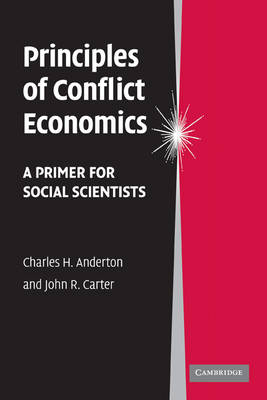
Principles of Conflict Economics
Cambridge University Press (Verlag)
978-0-521-87557-8 (ISBN)
- Titel erscheint in neuer Auflage
- Artikel merken
Conflict economics contributes to an understanding of violent conflict in two important ways. First, it applies economic analysis to diverse conflict activities such as war, arms races, and terrorism, showing how they can be understood as purposeful choices responsive to underlying incentives. Second, it treats appropriation as a fundamental economic activity, joining production and exchange as a means of wealth acquisition. Drawing on a half-century of scholarship, this book presents a primer on the key themes and principles of conflict economics. Although much work in the field is abstract, the book is made accessible to a broad audience of scholars, students and policymakers by relying on historical data, relatively simple graphs and intuitive narratives. In exploring the interdependence of economics and conflict, the book presents current perspectives of conflict economics in novel ways and offers new insights into economic aspects of violence.
Charles H. Anderton is Professor of Economics at the College of the Holy Cross, Worcester, Massachusetts, where he has taught since 1986. He coedited the volume Economics of Arms Reduction and the Peace Process with Walter Isard in 1992. A former North American editor of the journal Defence and Peace Economics, Professor Anderton's research has appeared in journals such as Economic Inquiry, Journal of Economic Behavior and Organization, Journal of Conflict Resolution, Conflict Management and Peace Science and Peace Economics, Peace Science, and Public Policy, as well as the Handbook of Defense Economics, Volumes I and II. John R. Carter is Professor of Economics at the College of the Holy Cross, Worcester, Massachusetts, where he has served on the faculty since 1976. A former Chair of the Department of Economics, Professor Carter received the Holy Cross Distinguished Teaching Award in 1992. His research has appeared in journals such as the Review of Economics and Statistics, Journal of Law and Economics, Journal of Economic Perspectives, Journal of Economic Behavior and Organization, Defence and Peace Economics, Journal of Peace Research and Public Choice, as well as the Handbook of Defense Economics, Volume II.
1. Introduction: definition and scope of conflict economics; 2. Production possibilities and the guns versus butter tradeoff; 3. Rational choice and equilibrium; 4. Fundamentals of game theory; 5. A bargaining model of conflict; 6. Conflict between states; 7. Civil war and genocide; 8. Terrorism; 9. Geography and technology of conflict; 10. Arms rivalry, proliferation, and arms control; 11. Military alliances; 12. Conflict success functions and the theory of appropriation possibilities; Appendix A. Statistical methods; Appendix B. A more formal bargaining model of conflict.
| Erscheint lt. Verlag | 23.3.2009 |
|---|---|
| Zusatzinfo | 17 Tables, unspecified; 115 Line drawings, unspecified |
| Verlagsort | Cambridge |
| Sprache | englisch |
| Maße | 158 x 235 mm |
| Gewicht | 580 g |
| Themenwelt | Sozialwissenschaften ► Politik / Verwaltung ► Europäische / Internationale Politik |
| Wirtschaft ► Volkswirtschaftslehre | |
| ISBN-10 | 0-521-87557-9 / 0521875579 |
| ISBN-13 | 978-0-521-87557-8 / 9780521875578 |
| Zustand | Neuware |
| Haben Sie eine Frage zum Produkt? |
aus dem Bereich



